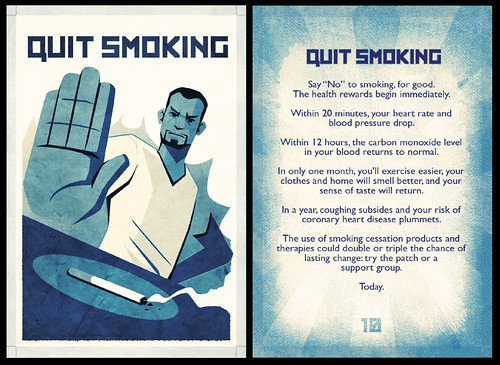You know you will greatly benefit from quitting smoking.
Putting the issue in writing can alter your entire outlook. This can help you to focus your quitting efforts more clearly, and might even make quitting easier because you are able to remain focused.
When you are trying to quit smoking, consider trying hypnosis. Many people have quit by going to a licensed hypnotist, and it could work for you, too. One the therapist places you in a hypnotic trance, and they speak to you in positive affirmations that embed themselves in your subconscious mind. When you are awakened from this trance, you might not be as interested in cigarettes as you were before, making your goal more attainable.
Make your attempts as easy on yourself as you can. Quitting cold turkey is definitely not be successful. This method of quitting has a 95 percent success rate. Nicotine is an extremely addicting substance, so medication, therapy or medication. This will ease you through the early withdrawal stages and make quitting easier.
Hypnosis has proven to be an effective tool to use when you stop smoking. Many individuals have quit successfully after working with a hypnotist. The professional can entrance you into a deep trance and provide you with positive affirmations. When you awake, you may find that your love for cigarettes has diminished, making giving them up easier.
Make a list of strategies to help you quit. This may be your best tool for success, if used to your advantage. Everyone does things their own way. It is very important that you specifically figure out what ways work the best for you. This is easy to determine by writing your own list.
Let your family and friends in on the secret that you plan to stop smoking. When you tell these people you’ve quit, they can do things to help you stay motivated and keep temptation away. This might just be the extra push that you need in order to keep on track with quitting smoking.
The first step of any program to stop smoking is making the endeavor before you figure out how you’re going to go about doing it. Most people who quit do so because they give up or stay in a lack of willpower. You can strengthen your resolve by remembering the many reasons on why you to quit.
Your doctor can help you quit smoking. There are medications available to help you stop smoking or to make the process easier. He can also give you information about local support groups, online resources or medical professionals who can help you through it.
Let family and friends know that you want to stop smoking. They are there for you and they will be able to help you that you need to quit. The most effective way to help you quit is by having people around who support system. This will make it a lot easier to succeed in your chance of successfully quitting smoking goals.
Reduce the number of cigarettes you smoke. This helps to guide you down the first step to reaching your goal of a smoke-free life. Try a delay of one hour after waking before you smoke your first morning cigarette. You can smoke half of a cigarette at a whole one to cut down on your smoking.
To prevent yourself from gaining weight after quitting smoking, snack on fresh fruits and vegetables instead of sweets or carb-laden foods. This is one way to combat the characteristic weight gain that comes with quitting. It is normal for your body to crave food during the quitting process, and the best way to silent your cravings and stabilize your mood is to eat healthy snacks.
The first step to stop smoking is to just stop right now. Stopping completely is the best way to really quit. Just stop and never pick up another cigarette. This method can appear somewhat harsh. It has actually been shown that this method can be quite effective.
If you are an indoor smoker, make sure to thoroughly clean the house, when you give up smoking. Wash the drapes and furniture, drapes and curtains and shampoo the carpet and upholstery. This will make your house smell clean and fresh, your fresh smelling house won’t remind you of smoking.
If you simply cannot quit smoking straight out, make use of nicotine gums or skin patches. These substitutes are OTC medications that replace some of the nicotine your body is used to getting from smoking. This can ease withdrawal symptoms, and increase your chances of quitting for good.
Plan how you will handle stressful times. Many smokers get used to smoking when they feel stressed. Keep a list of several distractions that you can use in case one doesn’t work out.
Stay away from trigger activities or symptoms in which you normally associate with smoking.
When you are trying to quit smoking, you have to stay away from the things that trigger you and make you smoke. Consider alternate activities during the times you normally would have had a cigarette. Distract yourself with something else at those times.
Even the people who are highly organized sometimes fail. You may find victory in a future effort down the future.
Instead of thinking that you “must” quit, think of it as a gift to yourself. Keep thinking about all the positive effects this will have on your life, and that there are far more reasons to quit than to keep smoking. This will give you the incentive and makes quitting seem immediately important.
Set a series of intermediate goals as part of your program to stop smoking. As you achieve each goal, reward yourself. For example, after a week without smoking, treat yourself to a movie. Once a month has passed, go out to dinner at a new restaurant. As you meet future milestones, you may wish to either increase your rewards or simply phase them out.
You are already aware of many benefits you will get if you stop smoking. However, these benefits might not be quite enough for giving you enough motivation to quit. Thankfully, the tips you’ve just read should give you assistance. Use the tips you have found here when you feel like your resolve is fading or those cravings hit. You will soon experience for yourself the benefits of not smoking.








